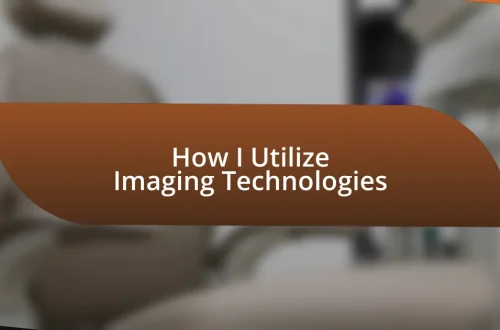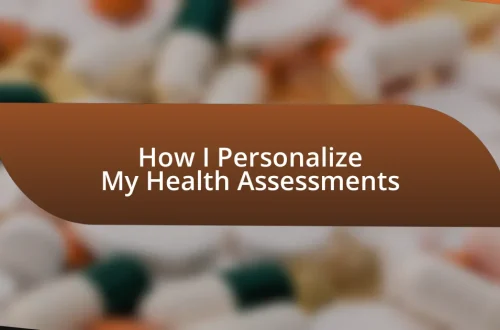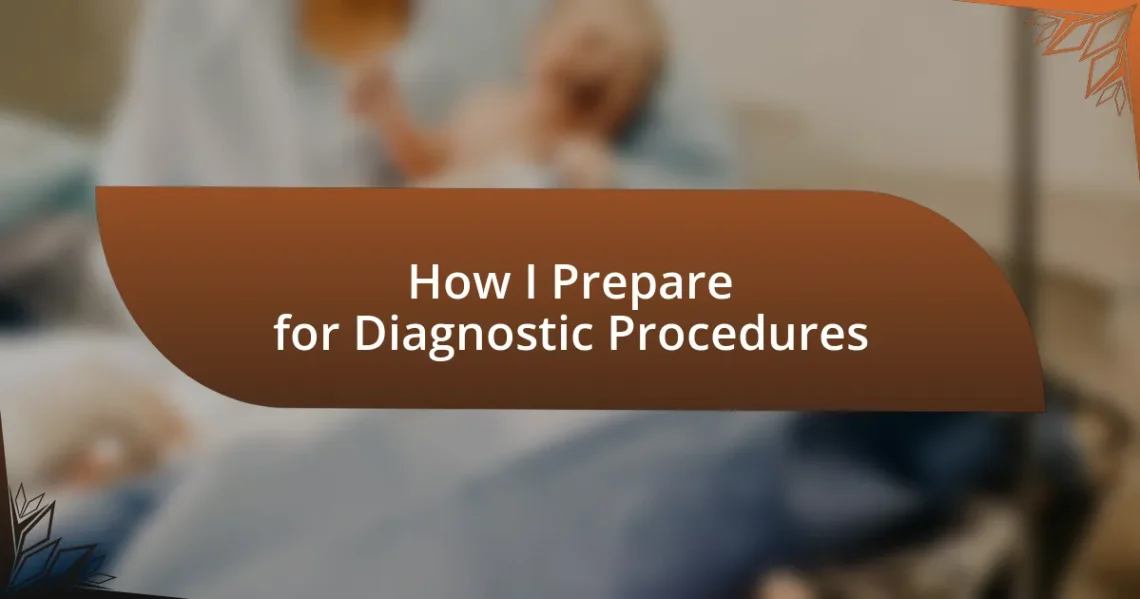
How I Prepare for Diagnostic Procedures
Key takeaways:
- Diagnostic procedures, ranging from blood tests to imaging, are essential for accurate diagnoses and treatment plans, with preparation significantly impacting results and patient experience.
- Reviewing medical and medication history is crucial for safety and tailored healthcare, fostering a stronger relationship between patients and providers.
- Coping strategies like deep breathing and visualization can effectively reduce anxiety before procedures, while support from loved ones enhances emotional well-being.
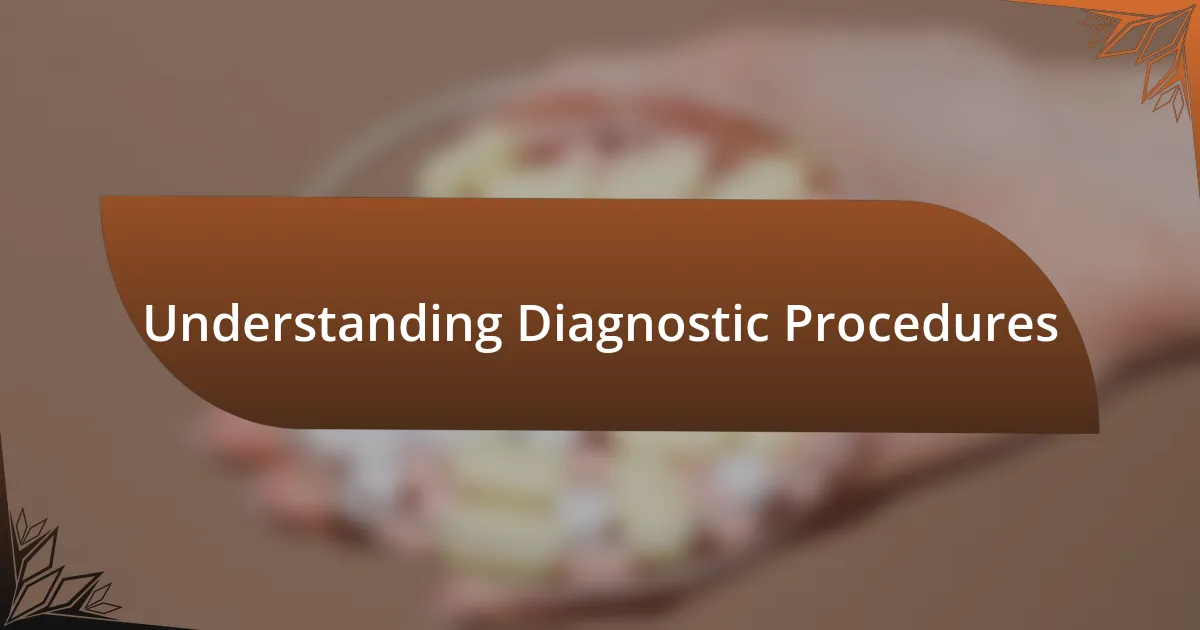
Understanding Diagnostic Procedures
Diagnostic procedures serve as crucial tools in medicine, allowing healthcare professionals to identify and understand medical conditions. I remember my first experience undergoing an MRI—it felt intimidating at first, but realizing its role in pinpointing my issue brought me a sense of calm. Isn’t it reassuring to know that these procedures can lead to accurate diagnoses and effective treatment plans?
These procedures range widely, from simple blood tests to complex imaging techniques. Each one has a specific purpose and can evoke a mix of emotions, from anxiety to hope. For instance, I vividly recall the nervous anticipation before a biopsy; the thought of the unknown can be quite daunting. Yet, I understood that this was a step toward uncovering vital information about my health.
Understanding the different types of diagnostic procedures can empower patients to engage more actively in their healthcare journeys. I often find myself contemplating how knowledge transforms fear into confidence. How much easier is it to face a procedure when you know what to expect? By knowing what these diagnostic tools do, we can better manage our emotions and expectations.
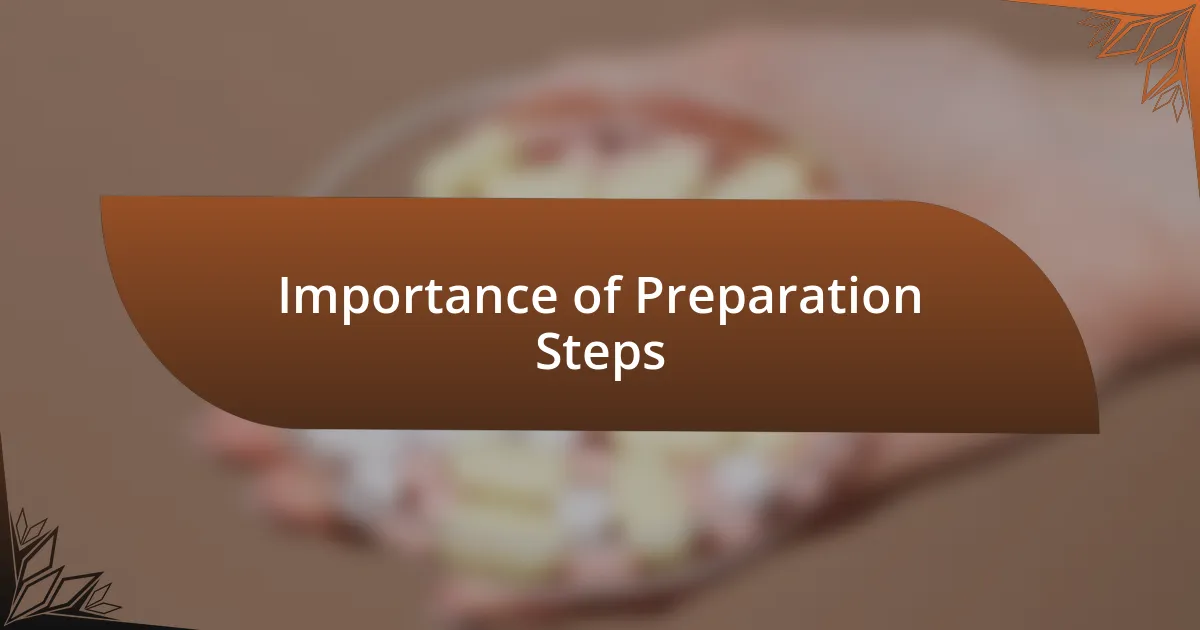
Importance of Preparation Steps
Preparation steps for diagnostic procedures are essential, as they can significantly influence the accuracy of test results and the overall experience. I recall preparing for my first endoscopy; I was initially anxious about the fasting required. However, understanding that these preparations were crucial for a clear view reassured me that my comfort and safety were priorities.
Here are some key reasons why preparation is vital:
- Accuracy of Results: Proper preparation ensures that tests yield the most accurate results, which is critical for effective diagnosis.
- Reduced Anxiety: Knowing what to expect can ease pre-procedure jitters. I found that having a checklist helped me feel more in control.
- Safety Considerations: Certain preparations are necessary to minimize risks during procedures, helping to protect patients from potential complications.
In my experience, taking the time to prepare properly not only enhances the quality of care but also encourages a sense of partnership between the patient and healthcare provider. When I approach these steps with intention, I feel more empowered in my health journey.
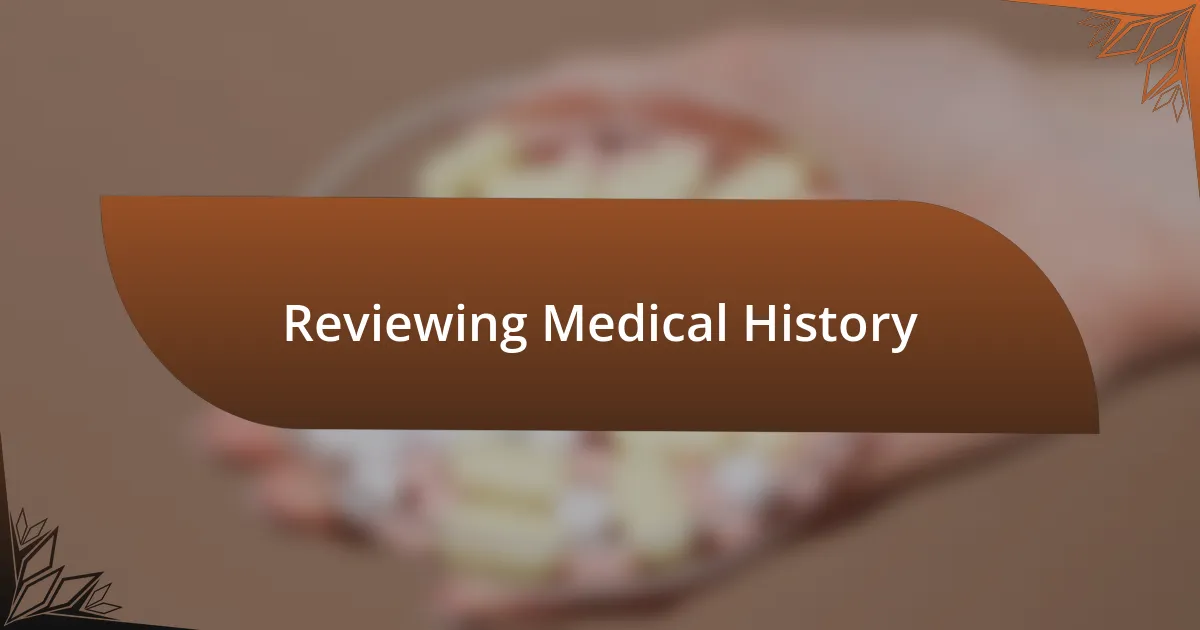
Reviewing Medical History
Reviewing your medical history is a critical step before undergoing any diagnostic procedure. I remember sitting with my doctor before a colonoscopy, going through my medical records. It was enlightening to see how past medical events, from surgeries to chronic conditions, could play a role in my current health. This reflection helped me understand why my doctor was interested in these details; they directly impact how the procedure is conducted and anticipated outcomes.
Furthermore, discussing medication history is equally important. One time, I neglected to mention a prescription I was taking, which could have affected the sedation process. Imagine my surprise when my doctor asked about all the medications I was on! Realizing the importance of this conversation changed my approach. I learned that being open and thorough about my medical background protects my safety during procedures.
This supportive communication fosters a better relationship with healthcare providers. I often encourage friends to ask questions about why certain details matter. When you understand the “why” behind these inquiries, it builds trust and ensures that the treatment you receive is tailored to your individual needs.
| Aspect | Importance |
|---|---|
| Medical Events | Influence on procedure and recovery |
| Medication History | Critical for safety and effectiveness of care |
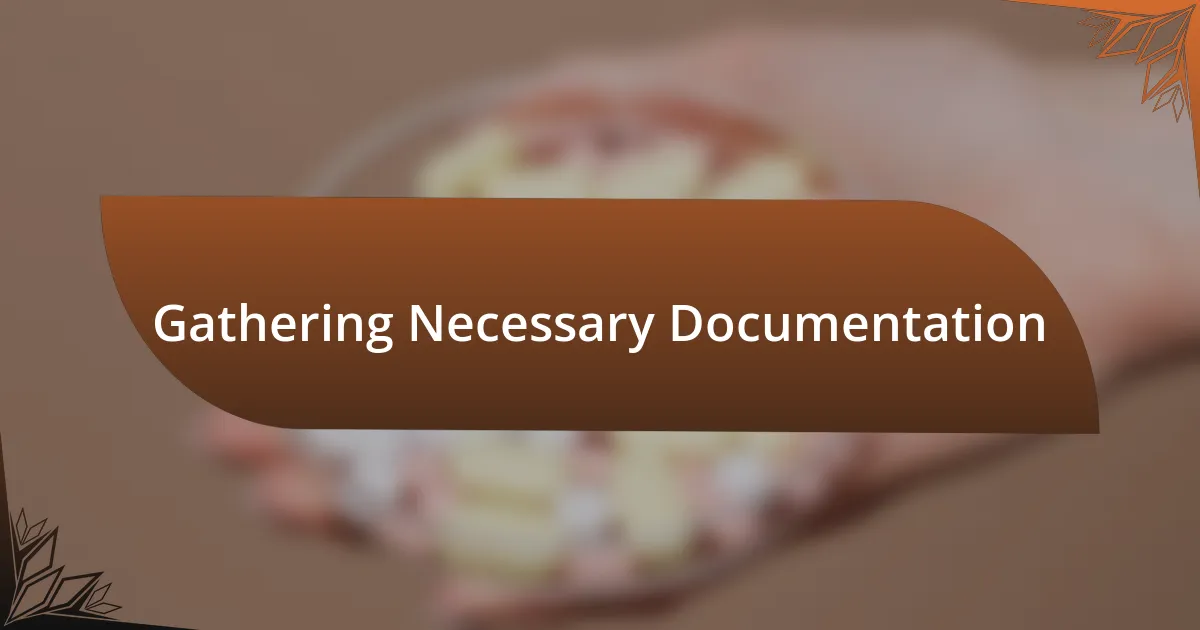
Gathering Necessary Documentation
Gathering necessary documentation is an essential part of preparing for any diagnostic procedure. I always compile a folder with my medical records, including test results and previous procedure notes. It feels reassuring to have everything organized, especially when you step into a healthcare facility where they might ask for your history in a hurry.
One time, I had to undergo an MRI, and I almost forgot to bring along my last imaging report. When I realized that, I felt a wave of anxiety. Having that past report helped the radiologist understand my condition better, leading to more accurate results. Have you ever considered how a single piece of paper could make such a difference in your care?
It’s also wise to include insurance documents and identification. I learned the hard way when an office visit turned stressful because I didn’t have my ID. Now, I check and double-check all my paperwork. Being prepared not only streamlines the process but also provides peace of mind, allowing me to focus on my health rather than handling logistics.

Consulting with Healthcare Providers
Consulting with healthcare providers is a vital step in preparing for any diagnostic procedure. I remember once sitting down with my doctor before a significant test, feeling a mixture of apprehension and hope. This meeting was my opportunity to voice my concerns and clarify what to expect; it truly made all the difference in how I approached the procedure.
During consultations, I like to ask specific questions, such as how the results will influence my treatment options. I recall a time when I learned about potential risks associated with a procedure – this knowledge helped me weigh the pros and cons more effectively. Have you ever found that your questions led to unexpected insights? It’s moments like these that can transform uncertainty into a clearer path forward.
Moreover, discussing my medications and allergies with my healthcare provider is essential. There was a moment when I neglected to mention a minor allergy, and it turned out to be a significant oversight. By having these conversations, I not only safeguard my health but also forge a stronger relationship with my provider, making future consultations more collaborative. After all, isn’t proactive communication the cornerstone of effective healthcare?
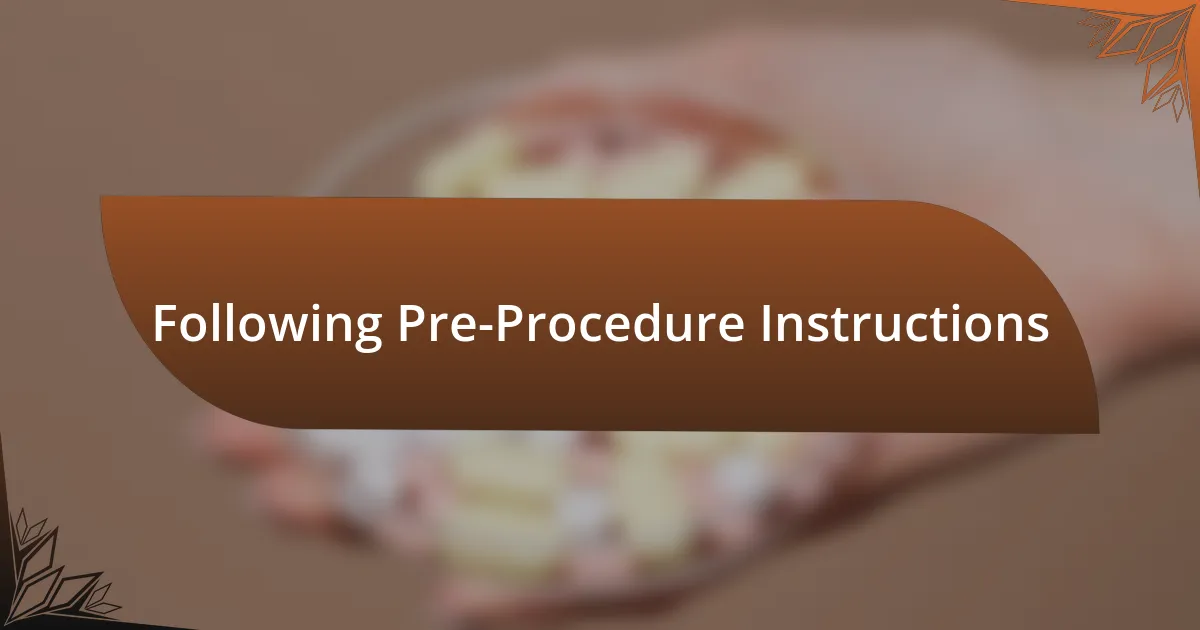
Following Pre-Procedure Instructions
Following pre-procedure instructions is crucial for ensuring that everything goes smoothly on the day of the diagnostic process. I remember a time when I had to fast before a procedure; I was initially frustrated by the idea of skipping breakfast. But as the hours passed, I realized that adhering to this instruction was essential to receive accurate results. It’s funny how sometimes a little discomfort can lead to better outcomes.
I always make it a point to create a checklist of pre-procedure guidelines, and I stick it on my refrigerator. This simple act of organization has saved me from rushing at the last minute or forgetting crucial steps. Have you ever experienced that rush of panic when you remember something important too late? By laying everything out in front of me, I feel more in control and less anxious about the procedure.
Moreover, I’ve found that reading any educational material provided by my healthcare team helps me understand what to expect. For example, I recall going through a brochure about my upcoming imaging test and discovering tips for relaxation techniques while I waited. Knowing what lay ahead made me feel more prepared, and it’s amazing how informed patients can breathe a little easier. What strategies do you use to familiarize yourself with the process? Seeking knowledge can turn anxiety into empowerment.
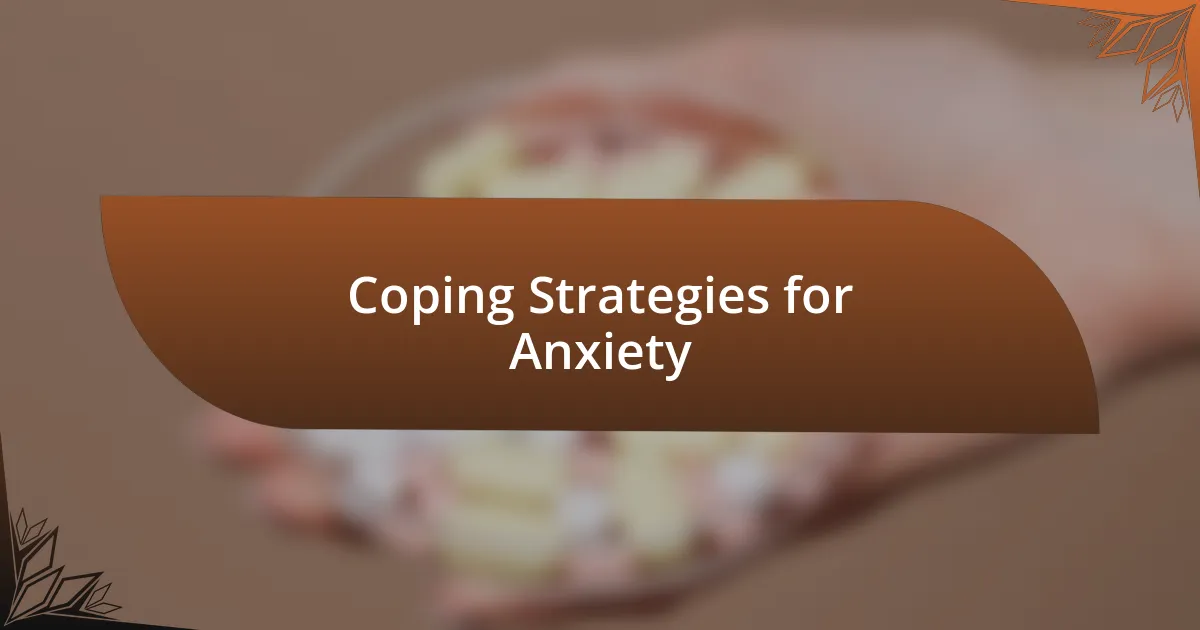
Coping Strategies for Anxiety
Coping with anxiety before a diagnostic procedure can feel overwhelming, but I’ve discovered several strategies that really help me. When I sense that familiar knot in my stomach, I turn to deep breathing exercises. Taking slow, deliberate breaths allows me to anchor myself in the present moment, which often distracts me from racing thoughts. Have you ever tried this? Just inhaling slowly for a count of four, holding for four, and exhaling for four can create a serene pocket of calm amid chaos.
Visualization is another tactic that has served me well. I remember vividly the first time I faced a daunting test; instead of fixating on what could go wrong, I imagined myself walking into the procedure room confidently and coming out with positive results. This mental rehearsal transformed my anxiety into a sense of anticipation, making the actual experience feel less intimidating. Have you ever pictured a peaceful scene to help alleviate stress? It’s remarkable how our minds can shape our emotional responses.
Additionally, reaching out for support from friends or family members has been invaluable. There’s something reassuring about sharing my fears, whether I’m discussing my worries over coffee or sending a quick text. Just hearing a loved one’s voice or knowing they are in my corner can provide a soothing balm for anxiety. What about you—do you find comfort in talking to loved ones, or do you prefer solitude before a big event? Finding what works for you is key in managing anxiety effectively.


